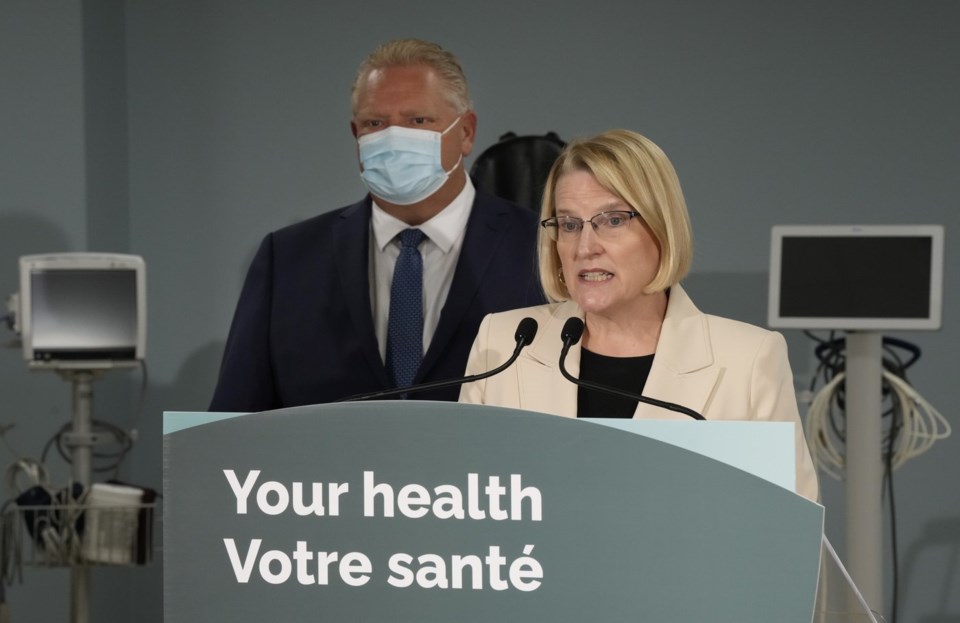As small communities across Ontario struggle to recruit doctors and nurses, one town has landed on a strategy that appears poised for success: giving them "a bag of money up front."
That's the incentive on offer in Huntsville, Ont., where local authorities say they will give an $80,000 signing bonus to any family physician who agrees to work in the town for at least five years.
Other communities are using similar tactics.
Blanche River Health in Kirkland Lake, a municipality in eastern Ontario, is offering $2,000 to anyone, anywhere in the world, who successfully refers a doctor or nurse to work at the hospital.
In Dryden, Ont., an isolated town more than 1,700 kilometres northwest of Toronto, the regional health centre's long-running doctor bonus scheme currently includes $37,500 for help with relocation expenses. Combined with separate provincial grants, doctors moving to Dryden could be given up to $155,000 for a four-year commitment.
Health experts warn that while these initiatives are understandable given the acute doctor shortages facing Ontario communities, they risk fuelling a "Hunger Games"-style competition for medical staff, putting further pressure on already cash-strapped municipalities.
Bob Stone is the local councillor who spearheaded Huntsville's new bonus initiative.
The plan, approved by council in May, hopes to attract 10 physicians.
Two months in, Stone said seven doctors have expressed interest and several are close to signing contracts.
“It is already working, and we are so excited and as soon as we actually have a contract signed, we are going to be telling the whole world,” he said.
Stone explained that Huntsville faced urgency to act. With waitlists for doctors growing longer, and several working doctors due to retire, almost a third of the town's 21,000 people risk not having a family doctor, he said.
Under the terms approved by council, any doctor taking over an existing practice gets $60,000. Doctors who open a new practice are given $80,000. The funds come from the municipal budget, Stone said.
“We're giving them that bag of money up front because that's what's really going to be the hook to get them to move here,” he said, adding the bonus is tied to a five-year commitment.
Jorge VanSlyke, president and CEO of Blanche River Health, which serves Kirkland Lake, said its community referral scheme has led to rising inquiries about available opportunities, but noted it was too early to tell if the program will work.
"You pretty much have to be the person that the successful candidate says is the source of referral and then we will contact you that way and we will provide the incentive," VanSlyke said.
"Whether it is going to be a success or not is yet unknown, but our goal right now is that no stone will be left unturned when it comes to our effort to recruit."
Ian Culbert, executive director of the Canadian Public Health Association, said the growing role of incentives to attract doctors is putting communities that are seen as less desirable in "an impossible situation."
While such programs have existed for decades in some rural and northern communities, they have noticeably accelerated since the pandemic.
"It is a very negative force as far as health equity goes. It creates an unlevel playing field and it is out of a sense of desperation,” Culbert said.
Culbert doesn't blame communities for offering bonuses, given the responsibility to provide health care to residents.
But he argued there are better ways to address rural doctor shortages, including student debt forgiveness tied to years of service in a community, or introducing medical students to the benefits of rural work through short-term programs while in medical school.
He also said the province needs to do more to address the gaps caused by its per capita health funding.
For Ontario Medical Association President Dr. Dominik Nowak, the first step must be addressing the overall shortage of family doctors.
Nowak said one in five Ontarians are without a family doctor, and soon it could be one in four. That shortage has triggered a chain reaction that has seen fewer people get an early diagnosis for a serious illnesses, which ultimately puts more pressure on hospitals.
"What this means for communities is that they're feeling the pain," he said.
Nowak supports several steps he said would allow doctors to see more patients, including using administrative staff to ease a paperwork burden, which currently consumes an average of 19 hours per week.
He also backs a team-based care system, where nurses, pharmacists, physiotherapists and others work more collaboratively to support doctors.
Nowak called for more provincial support to raise doctor numbers. He condemned bonus-driven recruitment as a "Hunger Games-style framing where communities have to compete for doctors and where communities are recruiting doctors from one community into their own."
In the meantime, incentive packages keep getting more elaborate.
In the municipality of Marmora and Lake, roughly 200 kilometres east of Toronto, doctors are being offered riverfront housing and clinic space at zero cost, among other incentives.
And in Huntsville, Stone said there is more than just cash available: multiple restaurants have offered $500 gift certificates for incoming doctors, a car dealership is offering a free car for a year and an area resort has put up a free golf club membership.
Because Huntsville does not want to steal doctors from its neighbours, physicians from within the Muskoka and surrounding municipalities are not eligible, but everywhere else is fair game, Stone said.
“Yes, it is a competition, and we're doing the very best for our own citizens," he said. "And I'm sorry about others that are having the same difficulties."
This report by The Canadian Press was first published Aug. 5, 2024
The Canadian Press
